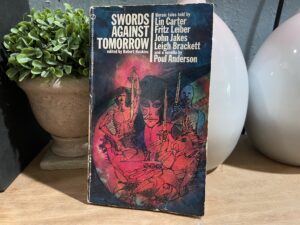
I can’t say I get the title. The rather generic — but perfectly acceptable — introduction by Robert Hoskins does not clarify. But what is important is not the title but the contents. And what contents!
The great Poul Anderson leads off with a story I’ve never encountered before, Demon Journey. Apparently it was originally published pseudonymously and not republished until this volume, a couple of decades later. I think I can guess why. I don’t believe Mr. Anderson was particularly proud of this one. The revelations later in the final act are rather unconvincing, the plot depends upon unlikely contrivances, and at least one intriguing — and seemingly important — bit of world building is never paid off. But all that aside, it is still Poul Anderson writing Sword and Sorcery. Even lesser Anderson is good Anderson. This one is pretty long, novella length, and he filled every page with color.
I couldn’t say how many times I’ve read Bazaar of the Bizarre by Fritz Leiber. It doesn’t really matter. I read it again and still enjoyed it.
Lin Carter is third with Vault of Silence. If you’ve read any of the Thongor stories, you know the style of prose you’ll be getting in Vault. He sets up a sort of fantastic, twelfth century Kievan Rus analog, then lets his imagination run wild. I enjoyed it. His character, Kellory, makes a fine archetype for anyone who wants to run a somewhat non-standard wizard in D&D. Only two items diminished my appreciation. One is the fact that a story based on magic use often feels like the writer is cheating being able to set up tension and conflict, then pretending that whatever hoodoo power he’s invented to get the hero out of it is somehow an act of strength and courage. The writer needs to establish the rules in advance, at least hinting at the solution and establishing its courageous nature. That doesn’t occur here. Second, this isn’t a full story. It reads like the first chapter in an epic. Nothing was resolved.
I’ve read Devils in the Walls before. It is one of John Jakes’ better Brak the Barbarian stories. I like it this time through as well. I wonder if anyone writing currently would include the use of a cruciform symbol as a focus of numinous power. It works here, I think, adding layers to the world Brak traverses.
Leigh Brackett contributes Citadel of Lost Ships. It is the only science fiction story, a retro-sf adventure story set in our system with the conceit that the inner planets and moons of the outer planets are inhabited. No swords appear, but it is the only tale to which one might apply the anthology title. It is a frontier story, taking place primarily on and in the orbit of Venus. With its space ship chases, high-tech gun battles, unique alien races, evil governments, and corrupt space station manager it is better Star Wars story than, say, Rebel Moon. But what else would one expect from Brackett? She was an old hand at this. My only quibble is it inclusion here. It sticks out in an anthology filled with S&S.
Overall, a solid collection. I enjoyed it despite the repeats. Nothing wrong with rereading something you enjoy.
Speaking of reading something you enjoy, I’m guessing you might enjoy Under Strange Suns. Give it a try. Let me know what you think.
